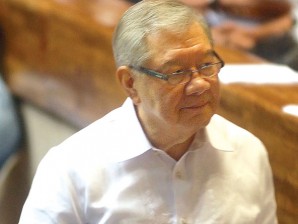
Speaker Feliciano Belmonte, principal author of an approved resolution to amend the protectionist provisions and foreign participation limits in the Constitution. INQUIRER FILE PHOTO
MANILA, Philippines—Charter change took a step closer to reality with the approval on Monday of a resolution to amend the protectionist provisions and foreign participation limits in the Constitution, despite dire warnings from local businessmen and legal experts.
The House committee on constitutional amendments approved the measure overwhelmingly, with 24 congressmen voting in its favor, two objecting and one abstaining.
The resolution, principally authored by Speaker Feliciano Belmonte, would add the phrase “unless otherwise provided by law” to the Constitution’s articles concerning the national economy and patrimony; education, science, technology, arts, culture and sports; and general provisions.
This would not automatically remove the foreign ownership and participation limits as stipulated in the Charter. Congress would still have to pass laws to lift the restrictions, and they may do this for the constitutional provisions that prevent foreigners from operating public utilities and educational institutions, and from undertaking activities to develop or utilize the country’s natural resources, for example.
Belmonte and the other proponents of the resolution had touted it as a tool to increase foreign direct investment to boost the economy.
With the approval, the resolution would now move to the plenary for deliberations. Should it be approved by the House, it would be forwarded to the Senate.
Once the Senate approves it, the measure would be subject to a plebiscite.
Consultations first
Bayan Muna Rep. Neri Colmenares had objected to the vote, saying public consultations all over the country should be completed first.
Colmenares also disagreed with the substance of the resolution, adding that allowing greater participation by foreign investors in the country’s affairs would not necessarily lead to progress and might be even detrimental to the country.
Economic and legal experts were also divided on the issue, he noted.
But foreign businessmen had vigorously supported Belmonte’s resolution, saying that more foreign investments would help modernize the country’s infrastructure and boost its defense capability.
They said the proposed amendment would also allow for more flexibility in the country’s economic policies and allow it to respond to changes brought about by globalization.
The Employers Confederation of the Philippines (Ecop), however, had warned that this could lead to instability, as the economic provisions and policies could be amended at any time, subject to the whims of the lawmakers. The fundamental law of the land would also be reduced to the level of ordinary legislation, Ecop pointed out.
Joint assembly
Ecop further warned that future Congresses might also insert the phrase “unless otherwise provided by law” to the social and political aspects of the Constitution.
Legal experts had also expressed reservations about the process the House followed.
Retired Supreme Court Justices Reynato Puno and Vicente Mendoza had said it would be better if both houses of Congress met in joint assembly and voted separately to tackle proposals to amend the Constitution.
They also expressed concern about the proposal in the Charter change resolution to add the phrase “unless otherwise provided by law” to the Constitution’s economic provisions, with Mendoza saying this would make the provisions subject to change by Congress anytime, and would thus render the constitutional policies “tentative and uncertain.”
But retired Justice Adolf Azcuna and constitutionalist Joaquin Bernas, both members of the commission that drafted the 1987 Constitution, took the position that Congress need not necessarily meet in a joint assembly to propose the changes.
Azcuna also supported Belmonte’s Charter change proposal, saying it would make the economic provisions flexible.
RELATED STORIES
House panel approves Charter change resolution
Charter change could lead to instability, employers warn
Palace: Aquino not buying Belmonte’s view on Charter change